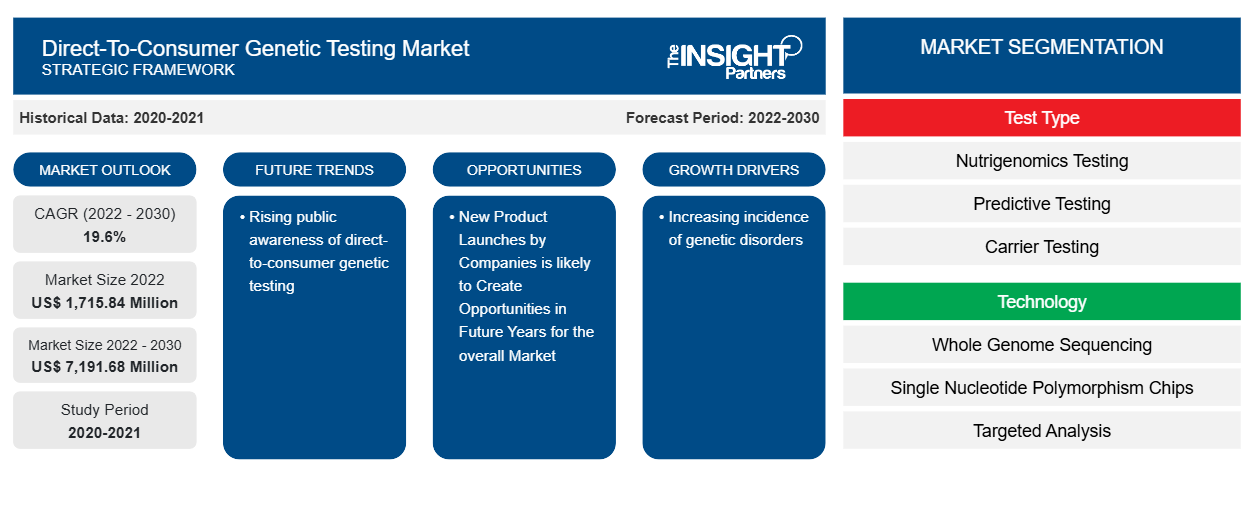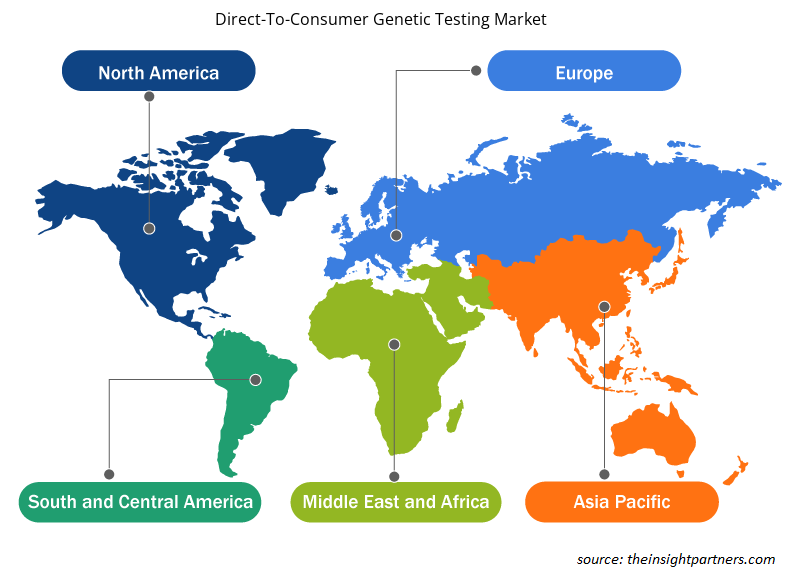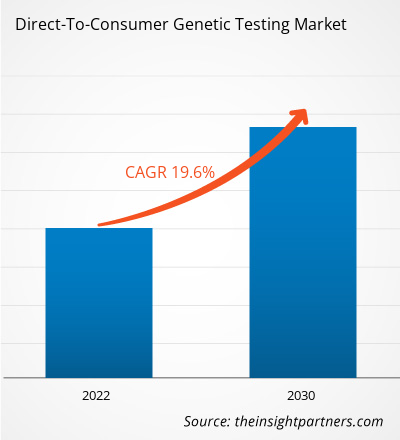The direct-to-consumer genetic testing market size was valued at US$ 1,715.84 million in 2022 and is expected to reach US$ 7,191.68 million by 2030. It is estimated to register a CAGR of 19.6% from 2022 to 2030.
The increasing incidence of genetic disorders and rising public awareness of direct-to-consumer genetic testing are likely to remain the direct-to-consumer genetic testing market trend.
Direct-To-Consumer Genetic Testing Market Analysis
According to the Gimjournal, most prevalence estimates tend to be disease specific, precluding an examination of genetic conditions in the pediatric population overall. An estimated 3.5% to 5.9% of individuals worldwide have 1 of approximately 7000 rare or genetic conditions. According to the Texas.gov, as of 2024, 1 in 22 people in the United States has a genetic disorder. 20-30% of all infant deaths are due to genetic disorders. Direct-to-consumer genetic testing promotes awareness of genetic diseases. It provides personalized information about health, disease risk, and other similar traits. Thus, the rising number of genetic diseases across the globe is expected to drive the global direct-to-consumer genetic testing market
Direct-To-Consumer Genetic Testing Market Overview
The increasing incidence of genetic disorders and rising public awareness of direct-to-consumer genetic testing are driving the demand for direct-to-consumer genetic testing products. However, DTC genetic testing often does not provide appropriate/conclusive results on whether the consumer will develop a disease or not which is one of the factors that are critically impacting the growth of the direct-to-consumer genetic testing market.
Customize This Report To Suit Your Requirement
You will get customization on any report - free of charge - including parts of this report, or country-level analysis, Excel Data pack, as well as avail great offers and discounts for start-ups & universities
Direct-To-Consumer Genetic Testing Market: Strategic Insights

- Get Top Key Market Trends of this report.This FREE sample will include data analysis, ranging from market trends to estimates and forecasts.
You will get customization on any report - free of charge - including parts of this report, or country-level analysis, Excel Data pack, as well as avail great offers and discounts for start-ups & universities
Direct-To-Consumer Genetic Testing Market: Strategic Insights

- Get Top Key Market Trends of this report.This FREE sample will include data analysis, ranging from market trends to estimates and forecasts.
Direct-To-Consumer Genetic Testing Market Drivers and Opportunities
Rising Public Awareness to Favor Market
Genetic disorders might impact cognitive development, leading to learning impairments or intellectual disabilities. Raising awareness of genetic disorders is not only about understanding the scientific aspects of such conditions but also about embracing the individuals and families who navigate life with them. According to the National Institutes of Health (NIH), the awareness level of genetic disease is 29.5%. Education is needed for the public about the predisposition, management, and inheritance of genetic diseases. Thus, rising public awareness across the globe is thereby contributing to the direct-to-consumer genetic testing market growth.
New Product Launches is Likely to Propel the Overall Direct-To-Consumer Genetic Testing Market Growth
In July 2023, Quest Diagnostics, one of the US-based diagnostic information service providers, launched its first consumer-focused genetic test named Genetic Insights. The concerned service will help people in understanding the risks of developing inheritable medical conditions. The service will also include personalized health reports and access to genetic counseling which is a service not commonly offered with similar services. Such a factor is responsible for the growth of the direct-to-consumer genetic testing market size.
Direct-To-Consumer Genetic Testing Market Report Segmentation Analysis
Key segments that contributed to the derivation of the Direct-To-Consumer Genetic Testing market analysis are test type and distribution channel.
- Based on test type, the direct-to-consumer genetic testing market has been segmented into nutrigenomics testing, predictive testing, carrier testing, and others. The predictive testing segment held the largest share of the market in 2022; the same segment is likely to follow a similar trend in the market during the forecast period.
- Based on the distribution channel, the direct-to-consumer genetic testing market has been online and offline. The offline segment held a larger share of the market in 2022. However, the online is estimated to register a higher CAGR in the market during the forecast period.
Direct-To-Consumer Genetic Testing Market Share Analysis by Geography
The geographic scope of the direct-to-consumer genetic testing market report is mainly segmented into five regions: North America, Asia Pacific, Europe, the Middle East & Africa, and South America/South & Central America.
Based on geography, the direct-to-consumer genetic testing market is segmented into five key regions: North America, Europe, Asia Pacific, South & Central America, and Middle East & Africa. The North America, direct-to-consumer genetic testing market has been analyzed based on three major countries — the US, Canada, and Mexico. The North America market held the largest share in 2023 and is expected to continue a similar trend during the forecast period. The US direct-to-consumer genetic testing market is estimated to hold the largest market share during the forecast period. The cost of DTC genetic testing varies from company to company but is roughly in the range of 100–1,000 US dollars, and DTC genetic testing is generally not covered by insurance. Rising expenditures in healthcare applications is further expected to boost the regional market growth during the forecast period.
Direct-To-Consumer Genetic Testing Market Regional Insights
The regional trends and factors influencing the Direct-To-Consumer Genetic Testing Market throughout the forecast period have been thoroughly explained by the analysts at The Insight Partners. This section also discusses Direct-To-Consumer Genetic Testing Market segments and geography across North America, Europe, Asia Pacific, Middle East and Africa, and South and Central America.

- Get the Regional Specific Data for Direct-To-Consumer Genetic Testing Market
Direct-To-Consumer Genetic Testing Market Report Scope
| Report Attribute | Details |
|---|---|
| Market size in 2022 | US$ 1,715.84 Million |
| Market Size by 2030 | US$ 7,191.68 Million |
| Global CAGR (2022 - 2030) | 19.6% |
| Historical Data | 2020-2021 |
| Forecast period | 2022-2030 |
| Segments Covered |
By Test Type
|
| Regions and Countries Covered | North America
|
| Market leaders and key company profiles |
Direct-To-Consumer Genetic Testing Market Players Density: Understanding Its Impact on Business Dynamics
The Direct-To-Consumer Genetic Testing Market is growing rapidly, driven by increasing end-user demand due to factors such as evolving consumer preferences, technological advancements, and greater awareness of the product's benefits. As demand rises, businesses are expanding their offerings, innovating to meet consumer needs, and capitalizing on emerging trends, which further fuels market growth.
Market players density refers to the distribution of firms or companies operating within a particular market or industry. It indicates how many competitors (market players) are present in a given market space relative to its size or total market value.
Major Companies operating in the Direct-To-Consumer Genetic Testing Market are:
- 23andMe, Inc.,
- Full Genome Corporation Inc.,
- Ancestry,
- Counsyl,
- Gene by Gene,
- Easy DNA,
Disclaimer: The companies listed above are not ranked in any particular order.

- Get the Direct-To-Consumer Genetic Testing Market top key players overview
Direct-To-Consumer Genetic Testing Market News and Recent Developments
The Direct-To-Consumer Genetic Testing market is evaluated by gathering qualitative and quantitative data post primary and secondary research, which includes important corporate publications, association data, and databases. The following is a list of developments in the market for innovations, business expansion, and strategies:
- In May 2024, iMeUsWe, one of the Indian genealogy platforms, launched at-home DNA testing services in collaboration with MapMyGenome. The goal is to provide insights into health, wellness, and ancestry, along with genetic counseling. Users can also benefit from India’s largest genetics database focusing on Indian sub-populations. The technology delivers a comprehensive breakdown of their ancestral origins. (Source: HEALTHCARERADIUS, Business)
- In October 2023, Basepaws, one of the leaders in feline DNA testing and genetics, entered canine market with the most extensive DNA test for dogs, accelerating the health genetic testing landscape. Basepaws Breed + Health Dog DNA Test helps pet owners shift from reactive to proactive care, offering convenient and easy swabbing and mobile-friendly results for a simplified experience. (Source: Zoetis, Media Statement Details)
Direct-To-Consumer Genetic Testing Market Report Coverage and Deliverables
The “Direct-To-Consumer Genetic Testing Market Size and Forecast (2020–2030)” report provides a detailed analysis of the market covering the following areas:
- Direct-To-Consumer Genetic Testing Market size and forecast at global, regional, and country levels for all the key market segments covered under the scope
- Market dynamics such as drivers, restraints, and key opportunities
- Direct-To-Consumer Genetic Testing Market trends
- Detailed PEST/Porter’s Five Forces and SWOT analysis
- Direct-To-Consumer Genetic Testing market analysis covering key market trends, global and regional framework, major players, regulations, and recent market developments
- Direct-To-Consumer Genetic Testing Industry landscape and competition analysis covering market concentration, heat map analysis, prominent players, and recent developments
- Detailed company profiles
Frequently Asked Questions
What is the expected CAGR of the Direct-To-Consumer Genetic Testing market?
The Direct-To-Consumer Genetic Testing market is anticipated to grow at a CAGR of 12.7% during 2024-2031.
What are the driving factors impacting the Direct-To-Consumer Genetic Testing market?
Factors including increasing incidence of genetic disorders and rising public awareness of direct-to-consumer genetic testing are driving the Direct-To-Consumer Genetic Testing market growth.
What would be the estimated value of the Direct-To-Consumer Genetic Testing market by 2031?
The Direct-To-Consumer Genetic Testing market is estimated to reach US$ 4526.76 million by 2031.
What are the future trends of the Direct-To-Consumer Genetic Testing market?
Rising number of product launches is one of the future trends of the market.
Which are the leading players operating in the Direct-To-Consumer Genetic Testing market?
23andMe, Inc.; Full Genome Corporation Inc.; Ancestry; Counsyl; Gene by Gene; Easy DNA; Helix OpCo LLC; Living DNA Ltd; Mapmygenome; and GenomeWeb are some leading players operating in the Direct-To-Consumer Genetic Testing market.
Which region dominated the Direct-To-Consumer Genetic Testing market in 2023?
North America dominated the Direct-To-Consumer Genetic Testing market in 2023.
- Historical Analysis (2 Years), Base Year, Forecast (7 Years) with CAGR
- PEST and SWOT Analysis
- Market Size Value / Volume - Global, Regional, Country
- Industry and Competitive Landscape
- Excel Dataset
Testimonials
Reason to Buy
- Informed Decision-Making
- Understanding Market Dynamics
- Competitive Analysis
- Identifying Emerging Markets
- Customer Insights
- Market Forecasts
- Risk Mitigation
- Boosting Operational Efficiency
- Strategic Planning
- Investment Justification
- Tracking Industry Innovations
- Aligning with Regulatory Trends
Yes! We provide a free sample of the report, which includes Report Scope (Table of Contents), report structure, and selected insights to help you assess the value of the full report. Please click on the "Download Sample" button or contact us to receive your copy.
Absolutely — analyst assistance is part of the package. You can connect with our analyst post-purchase to clarify report insights, methodology or discuss how the findings apply to your business needs.
Once your order is successfully placed, you will receive a confirmation email along with your invoice.
• For published reports: You’ll receive access to the report within 4–6 working hours via a secured email sent to your email.
• For upcoming reports: Your order will be recorded as a pre-booking. Our team will share the estimated release date and keep you informed of any updates. As soon as the report is published, it will be delivered to your registered email.
We offer customization options to align the report with your specific objectives. Whether you need deeper insights into a particular region, industry segment, competitor analysis, or data cut, our research team can tailor the report accordingly. Please share your requirements with us, and we’ll be happy to provide a customized proposal or scope.
The report is available in either PDF format or as an Excel dataset, depending on the license you choose.
The PDF version provides the full analysis and visuals in a ready-to-read format. The Excel dataset includes all underlying data tables for easy manipulation and further analysis.
Please review the license options at checkout or contact us to confirm which formats are included with your purchase.
Our payment process is fully secure and PCI-DSS compliant.
We use trusted and encrypted payment gateways to ensure that all transactions are protected with industry-standard SSL encryption. Your payment details are never stored on our servers and are handled securely by certified third-party processors.
You can make your purchase with confidence, knowing your personal and financial information is safe with us.
Yes, we do offer special pricing for bulk purchases.
If you're interested in purchasing multiple reports, we’re happy to provide a customized bundle offer or volume-based discount tailored to your needs. Please contact our sales team with the list of reports you’re considering, and we’ll share a personalized quote.
Yes, absolutely.
Our team is available to help you make an informed decision. Whether you have questions about the report’s scope, methodology, customization options, or which license suits you best, we’re here to assist. Please reach out to us at sales@theinsightpartners.com, and one of our representatives will get in touch promptly.
Yes, a billing invoice will be automatically generated and sent to your registered email upon successful completion of your purchase.
If you need the invoice in a specific format or require additional details (such as company name, GST, or VAT information), feel free to contact us, and we’ll be happy to assist.
Yes, certainly.
If you encounter any difficulties accessing or receiving your report, our support team is ready to assist you. Simply reach out to us via email or live chat with your order information, and we’ll ensure the issue is resolved quickly so you can access your report without interruption.





















 Get Free Sample For
Get Free Sample For